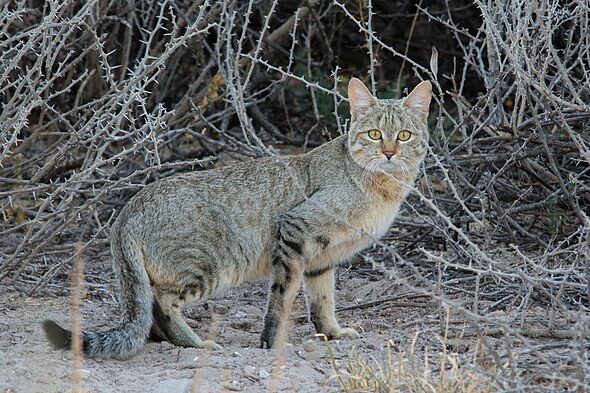
For the first time in 500 years, dozens of wildcats will be released into the English countryside.
Dutzendes of European wildcats will be released into rural Cornwall and Devon as part of a new, ground-breaking conservation project.
For the first time in over two centuries, between 40 and 60 of the wildcats, which can grow to be twice as big as a domesticated cat, will be released into the wild to hunt rabbits and other small animals.
In the 16th century, wildcats were hunted to extinction in most of Britain due to their thick, dense fur and the threat they posed to rabbits.
With only 200 remaining in remote parts of northern Scotland, they are the most endangered native mammal in the UK today.
According to the Devon Wildlife Trust, conservationists hope that their reintroduction into the English countryside will result in them playing an important ecological role there.
Derek Gow, a conservationist and “rewilder,” owns five mating pairs of cats on his farm in Lifton, Devon. The Royal Zoological Society of Scotland gave them to him to breed.
Over the past few years, he has run a successful program for breeding cats in captivity. Now, he is working with the Devon Wildlife Trust to release dozens of cats into the wild.
At first, the cats, who eat mice and rabbits and other small mammals, will live in secret in rural Devon and Cornwall.
Experts say that the wildcats won’t be a threat to people or pets because they will live in dense woodland and fly away when they see someone.
Mr Gow, 57, said: “If we have the ability to save a nearly extinct species which once populated all of Britain until we hunted them to the brink why would we not reintroduce them?
“Along with beavers and pine martins they will play a key role in restoring our landscape to its natural state.
‘This is just one small step in the right direction, returning wildcats to our forests will help rejuvenate them.”
He provided a “check on rampant mice and rabbits,” whose populations have grown to an uncontrollable number, and stated that all animals have an essential effect on their ecosystems.
He added: “As a species we have culled wild animals to death and now is the time for us to start reversing that trend.”
The Devon Environment Foundation recently provided funding to the Devon Wildlife Trust to conduct in-depth research into the most effective strategy for reintroducing these wildcats into the county.
Although European wildcats are larger and bulkier than domestic cats, their appearance is very similar to that of the typical tabby cat. They have distinctive tails with three to five black rings around them before a black tip, broader heads, and longer legs.
The wildcat is related to the domestic cat but not its ancestor.
Peter Burgess, director of nature recovery at DWT, said: ‘They naturally stay far away from human habitation and it will be a miracle if people even find evidence that they have been around, never mind come across them.
“Ideally we will be selecting coastal scrubland and dense forests as places where they can be released.
“With any luck they will slowly begin building up their population and repopulate the county and eventually the country.”
He added: “We are confident that people will get behind the project and support saving a species which is nearly extinct.”
——————————————————————————
At Natural World Fund, we are passionate about stopping the decline in our wildlife.
The declines in our wildlife is shocking and frightening. Without much more support, many of the animals we know and love will continue in their declines towards extinction.
When you help to restore a patch of degraded land through rewilding to forests, meadows, or wetlands, you have a massive impact on the biodiversity at a local level. You give animals a home and food that they otherwise would not have had, and it has a positive snowball effect for the food chain.
We are convinced that this is much better for the UK than growing lots of fast-growing coniferous trees, solely to remove carbon, that don’t actually help our animals to thrive.
This is why we stand for restoring nature in the UK through responsible rewilding. For us, it is the right thing to do. Let’s do what’s right for nature!
Support our work today at https://naturalworldfund.com/ and join in the solution!

